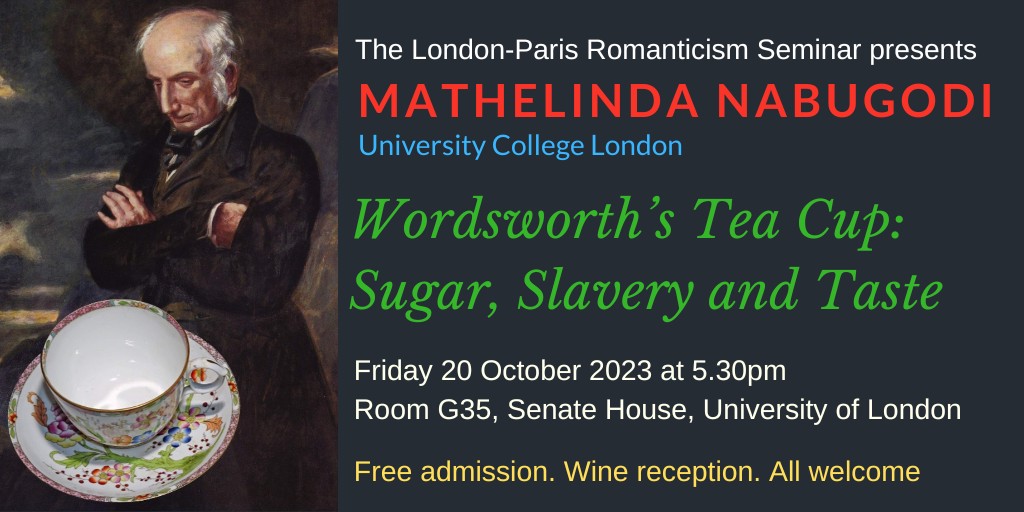
The first meeting of this year’s London-Paris Romanticism Seminar will take place on Friday 20 October 2023 at 5.30 pm in the Bloomsbury Room (G35, ground floor) of Senate House, University of London. To launch our 2023-24 series, we are delighted to welcome as our guest speaker Dr Mathelinda Nabugodi of University College London, who will present a paper entitled Wordsworth’s Tea Cup: Sugar, Slavery and Taste. This will be followed by a discussion and wine reception. The event is free and open to everyone, including postgraduates and members of the public. The seminar will be chaired by David Duff.
Mathelinda Nabugodi is a Lecturer in Comparative Literature at University College London. She is the author of Shelley with Benjamin: A Critical Mosaic (2023) and one of the editors on the Longman edition of The Poems of Shelley. This talk grows from her current book project, The Trembling Hand: Reflections of a Black Woman in the Romantic Archive, which is structured around a series of encounters with objects contained in the archives of the major Romantic poets, including Wordsworth’s tea cup. A work-in-progress sample from the book won the 2021 Deborah Rogers Foundation Writers Award and a 2022 Whiting Foundation Creative Non-Fiction Grant. She has also published articles on translation, ekphrasis, creative/experimental criticism, and the racist history of hair.
Regarding the subject of her talk, Mathelinda writes:
‘This talk is about a tea cup. Gifted to the poet William Wordsworth in 1816 and in use for several decades, it is a curiously garish object that invites us to think about taste in both literal and aesthetic terms. Some two hundred years ago the poet and other members of his household stirred sugar produced by enslaved Africans in the Caribbean into this very cup, to sweeten tea produced under comparably brutal conditions in Asia. This innocuous household object sits at the heart of a global network of exploitative food production. I begin my talk by discussing the association between sugar and slavery in the British imagination in general before examining two political sonnets by Wordsworth that engage with Black subjects. Both sonnets – one dedicated to the Haitian Revolutionary Toussaint L’Ouverture and the other describing an unnamed Black refugee woman – were first published in 1803, but Wordsworth kept reworking them over and over again, still making revisions in the final lifetime edition of 1846. In placing Wordsworth’s increasingly distasteful revisions against the backdrop of his hardening conservatism and embrace of a pro-slavery position in the debates leading up to the Slavery Abolition Act of 1833, I am looking for a way of acknowledging my own anger at Wordsworth within an “objective” literary historical reconstruction of the political context in which his opinions were formed.’